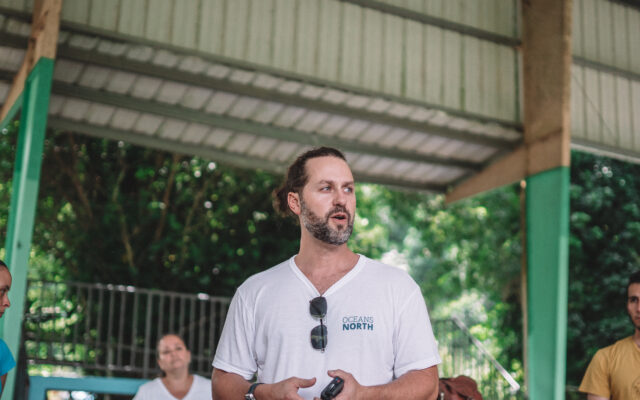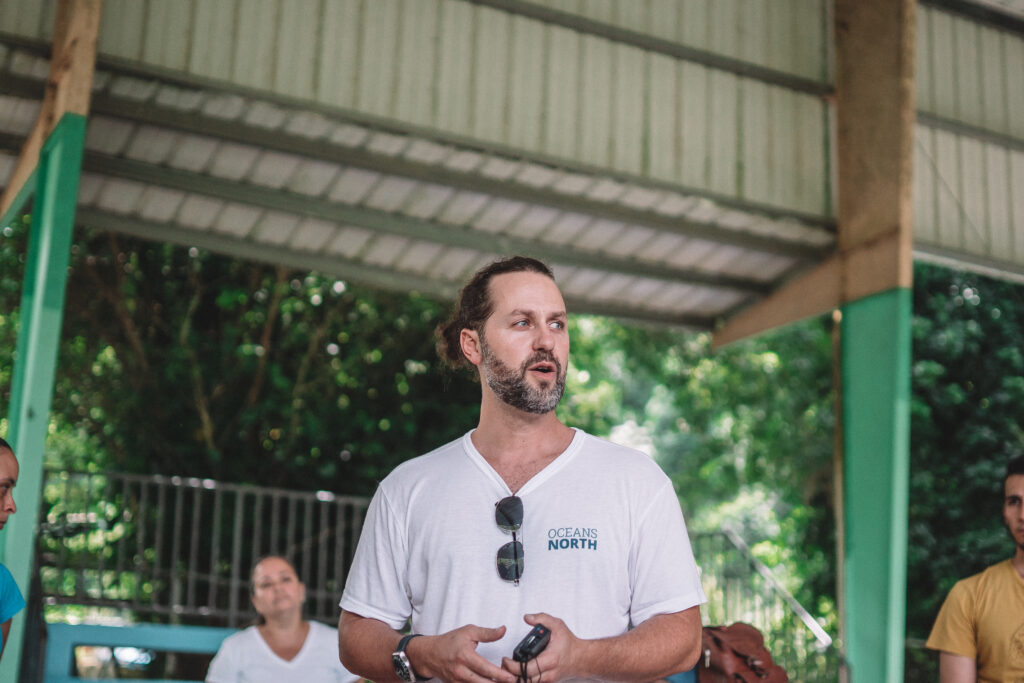
Maine is inspiring Canada to help more fish
By Julie Harris, Bangor Daily News Staff
Maine’s progress in salmon restoration over the last decade is inspiring Atlantic Canada to work harder toward its goals for the fish, the new president and chief executive officer of the Atlantic Salmon Federation said.
Louie Porta, 43, was named to the federation’s lead post in May. He won’t fully take over the helm from Bill Taylor until Sept. 30. Taylor led the federation for 29 years.
Maine has made great strides toward salmon restoration with the removal of several smaller and a handful of larger dams on rivers, replacement of small culverts with fish-friendly bridges, addition of fishways and restoration of salt marshes.
A dam removed earlier this summer from the Crooked River, which flows into Maine’s second largest inland water body, could make it possible for Sebago Lake’s salmon population to restore itself to wild, native fish someday.

NEW PRESIDENT/CEO — Louie Porta, a former Maine resident, will fully take over the helm of the Atlantic Salmon Federation at the end of September. He was named president and CEO in May, replacing Bill Taylor.
Projects on the Penobscot, Narraguagus and Sandy rivers are all working toward the fish’s restoration as well. There is a push underway now to remove four dams from the Kennebec River.
But Maine’s true success cannot be measured without looking at the larger picture, which includes Atlantic Canada and the ocean phases of the salmon’s life cycle. That’s where Porta comes in with his new role as leader of Atlantic salmon’s strongest advocacy group.
“Maine is providing hope that Atlantic Canada can take inspiration from,” said Porta, who lives in New Brunswick. “We need to celebrate successes. They keep us hopeful we can have opportunities for meaningful projects in Canada.”
Porta, who is originally from the Portland-Scarborough area in Maine, has a very global view about conservation. He sees the connections between what is going on in the United States, Canada and other parts of the world because he’s been to places such as Alaska, Greenland and Japan on missions of environmental diplomacy.
His federation goals include to work on larger, bolder conservation issues; deepen partnerships and establish new ones; find new funding and energy through private foundations and philanthropy; try old, great ideas again and not be afraid to experiment with new approaches; and understand the common values and connect them through the issues that need to be addressed.
Porta advocates for understanding people’s roles in the ecosystem, as well as what the natural world needs to survive and thrive. He believes in using all knowledge available to analyze any particular situation, whether it comes through indigenous practices or belief systems, scientific research, personal experience or just regular people living their lives.
“Good hunters are often the best conservationists,” he said, explaining that they are in their patches of woods or fields often and notice changes sooner than might a biologist or forester who visits occasionally.
The important thing is to act on what can be changed or repaired now, and to only stay involved if you are helping. If you’re not needed, leave it alone, he said.
He suggested working on practical things, such as the recently developed zero emissions EV lobster boat in Canada. There are roughly 3,000 licensed lobster boats in Canada and 4,000 in Maine, he said. Investing in cleaner energy for that many boats can support changes that make a better environment for species such as Atlantic salmon.
Porta has done a lot of conservation work, most recently as the founder of Oceans North, which was begun in 2005. Among the group’s several projects was an Arctic marine atlas it created in conjunction with the region’s indigenous people. The atlas gives an overview of seabirds, fish, marine mammals and other wildlife and their relationship to a healthy ecosystem, according to the group’s website.
He started the nonprofit to protect the environment for things, not from them, he said, and it grew to Canada’s largest ocean charity organization. He also started a sister organization in Greenland for the same purposes.
He established a sizable national marine conservation area off Baffin Island, located between Greenland and the Canadian mainland, and was a senior adviser in the International Institute of Sustainable Development, which fosters harmony between humans and nature, and economic success without destroying the environment.
Although scientists, conservation groups and nonprofits spend time in rivers, streams and forests, they need to pay attention to the oceans and coastal conditions too because an important part of the fish’s life cycle is lived there, he said.
There are steps that can be taken now in the salmon’s ocean territories, he said, including restricting aquaculture and other activities in prime salmon habitat, preventing new things such as ocean mining from challenging the species’ vitality and allowing conservationists and scientists to map the entire life cycle of the fish, including the areas they live in the ocean.
On the topic of invasive species, Porta said there are critical issues that should be solved and not just managed, including restoring balance in places where it is out of kilter.
He gave the example of how striped bass became a problem for the Atlantic salmon in the Miramichi River in New Brunswick. The government created a quota for stripers and the annual harvest of them went from 50 tons to 170, bringing the fish populations back in balance.
That action was similar to one in Maine in which the state changed the harvest regulations for lake trout in Moosehead because that species was threatening the native brook trout and landlocked salmon.
Porta said that kind of response lets you have an immediate impact toward solving the problem but also gives you more time toward a longer term solution.
“It’s very sobering. Humans can be great caretakers, great stewards, but can have a negative impact,” he said.